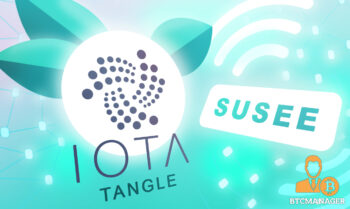
2018-7-28 23:00 |
German non-profit IOTA Foundation has partnered with Audi’s Think Tank Denkwerkstatt and started a week-long Google Design Sprint to create a permissionless mobility ecosystem based on Tangle, the foundation announced on July 25, 2018.
Tangle Technology – The Driver for the Sustainable FutureThe project involves exploring Tangle-based use cases, creating a low-level prototype, and gathering customer feedback.
Based on a Directed Acyclic Graph (DAG), Tangle is a new method which solves the limitations of blockchain and still allows the storage of data in a decentralized and secure manner.
For a transaction to take place successfully in a Tangle through a node, it has to verify two previous transactions first. This is the role of an algorithm. To validate a transaction, a node must give Proof of Work by solving a cryptographic puzzle. After the node accomplishes this task, the transaction can proceed. The tangle eliminates the need for miners because the node itself acts as a miner. The result? No more transaction costs.
The members of Audi Denkwerkstatt team include seven Audi employees who will assist 15 colleagues from all business sectors, levels, and age groups in the creation, validation, and implementation of ideas related to premium mobility within a six-month period.
The project’s goal is to establish business models independently or in cooperation with others.
IOTA has an open source protocol whose purpose is to become “an innovation accelerator for any business ideas that rely on trust in data, scalable and safe machine to machine communication and transaction settlement.”
Founded in 2015 by David Sonstebo, Sergey Ivancheglo, Dominik Scheiner, and Dr. Sergeuei Popov, IOTA is an open-source distributed ledger, or cryptocurrency focused on providing secure communication and payments between machines on the Internet of Things (IoT) – therefore the name.
The company uses DAG technology instead of the traditional blockchain technology. This allows IOTA’s transactions to be free regardless of the transaction amount.
Additionally, confirmations times are faster, there is no limit to the number of transactions the system can handle simultaneously, and the system can easily scale.
The IOTA Foundation coordinates and funds development in the IOTA ecosystem.
It aims to create sustainable ecosystems around IOTA to accelerate its development and commercial adoption as an open-source technology.
(Source: IOTA Foundation)
IOTA’s Other Projects Aiming Toward SustainabilityThis is not the first time IOTA takes part in projects essential for the future of all of us. In early July 2018, the IOTA Foundation partnered with Energy Agency of Plovdiv, GKinetic Energy, ABB Norway, Future Analytics Consulting, Statkraft Varme AS, AVIS Budget Group, ATB, ISOCARP, IES R&D, Powel AS, University of Limerick, and others, on the smart city project +CityxChange.
The ingenious project received the funding of the European Union in the amount of €20 million as part of the smart city lighthouse project.
The European Commission lists the project under its “Smart Cities and Communities” section.
Smart cities refer to the potential of technology to one day remove outdated systems and create more sustainable cities and solutions for the future.
Over 66 percent of cities across the world have implemented or are exploring options to incorporate smart city technology to help them collect, group, organize and analyze real-time information to help citizens to make their everyday activities more efficient and time-saving.
While CyberView, a blockchain-based government-owned company believes blockchain technology is the answer for this, IOTA doesn’t.
As previously mentioned, IOTA focuses more on a different type of distributed ledger technology, Tangle, a new data structure which bases on DAG and doesn’t even need miners and data blocks.
The post Audi Denkwerkstatt and IOTA Foundation to Look into Tangle-Based Mobility Uses appeared first on BTCMANAGER.
origin »Bitcoin price in Telegram @btc_price_every_hour
Intelligent Trading Foundation (ITT) на Currencies.ru
|
|






